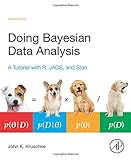The library used (Bayadera) is still pre-release, so much polishing is still needed, so this can be considered a preview. But, it is still very useful, and not more complex for programmers than the mainstream Bayesian tools.
[1] https://www.amazon.com/Doing-Bayesian-Data-Analysis-Second/d...
It gives a gentle but through introduction from first principles; lots of good intuition and 'why'.
It works well with "Probabilistic Programming & Bayesian Methods for Hackers" also mentioned, but I'd start with this. It is much more accessible than many other introductory books, IMO.
I should say that the first step is to clone:
cd where_you_want_the_data_to_be_copied git clone ....
# and now start jupyter notebook with
jupyter notebook
# go to File/open/ and select the first section.
I see that I can edit the markdown. I translated the introduction to section 0, here it goes. Thanks for this tutorial. The graphics are nice.
### Sección 0: Introducción Bienvenido a "Bayesian Modelling in Python" - un tutorial para personas interesadas en técnica de estadística bayesiana con Python. La lista de secciones del tutorial se encuentra en la página web del projecto [homepage](https://github.com/markdregan/Hangout-with-PyMC3).
La estadística es un tema que en mis años de universidad nunca me gustó . Las técnicas frecuentistas que nos enseñaron (p-values, etc.) parecían rebuscadas y en última instancia di la espalda a este tema en el que no estaba interesado.
Esto cambió cuando descubrí la estadística Bayesiana - una rama de la estadística bastante diferente a la estadística frecuentista que se suele enseñar en la mayoría de las universidades. Mi aprendizaje se inspiró en numerosas publicaciones, blogs y videos. A los que se inician en la estadística bayesiana les recomendaría fervientemente los siguientes:
- [Doing Bayesian Data Analysis](http://www.amazon.com/Doing-Bayesian-Analysis-Second-Edition...) by John Kruschke - [Python port](https://github.com/aloctavodia/Doing_Bayesian_data_analysis) of John Kruschke's examples by Osvaldo Martin - [Bayesian Methods for Hackers](https://github.com/CamDavidsonPilon/Probabilistic-Programmin...) fue para mí una gran fuente de inspiración para aprender estadística bayesiana. En reconocimiento de la gran influencia que ejerció en mí, he adoptado el mismo estilo visual que se usa en BMH. - [While My MCMC Gently Samples](http://twiecki.github.io/) blog de Thomas Wiecki - [Healthy Algorithms](http://healthyalgorithms.com/tag/pymc/) blog de Abraham Flaxman - [Scipy Tutorial 2014](https://github.com/fonnesbeck/scipy2014_tutorial) de Chris Fonnesbeck
He creado este tutorial con la esperanza de que otros lo encontrarán útil y que les servirá para aprender técnicas bayesianas de la misma forma que me ayudaron a mí. Cualquier aportación de la comunidad corrección/comentario/contribución será bienvenida.
Machine Learning: The Art and Science of Algorithms that Make Sense of Data (Flach): http://www.amazon.com/Machine-Learning-Science-Algorithms-Se...
Machine Learning: A Probabilistic Perspective (Murphy): http://www.amazon.com/Machine-Learning-Probabilistic-Perspec...
Pattern Recognition and Machine Learning (Bishop): http://www.amazon.com/Pattern-Recognition-Learning-Informati...
There are some great resources/books for Bayesian statistics and graphical models. I've listed them in (approximate) order of increasing difficulty/mathematical complexity:
Think Bayes (Downey): http://www.amazon.com/Think-Bayes-Allen-B-Downey/dp/14493707...
Bayesian Methods for Hackers (Davidson-Pilon et al): https://github.com/CamDavidsonPilon/Probabilistic-Programmin...
Doing Bayesian Data Analysis (Kruschke), aka "the puppy book": http://www.amazon.com/Doing-Bayesian-Data-Analysis-Second/dp...
Bayesian Data Analysis (Gellman): http://www.amazon.com/Bayesian-Analysis-Chapman-Statistical-...
Bayesian Reasoning and Machine Learning (Barber): http://www.amazon.com/Bayesian-Reasoning-Machine-Learning-Ba...
Probabilistic Graphical Models (Koller et al): https://www.coursera.org/course/pgm http://www.amazon.com/Probabilistic-Graphical-Models-Princip...
If you want a more mathematical/statistical take on Machine Learning, then the two books by Hastie/Tibshirani et al are definitely worth a read (plus, they're free to download from the authors' websites!):
Introduction to Statistical Learning: http://www-bcf.usc.edu/~gareth/ISL/
The Elements of Statistical Learning: http://statweb.stanford.edu/~tibs/ElemStatLearn/
Obviously there is the whole field of "deep learning" as well! A good place to start is with: http://deeplearning.net/
